- “WOMEN’S EMPOWERMENT IS AN ISSUE THAT CROSSES ALL SOCIO ECONOMIC BOUNDARIES.” September 23, 2019
Speaking on the subject of women’s empowerment and gender biases in all walks of life, Member of Parliament, Meenakshi Lekhi made it a point to explain how the notion applies not only to those who have succeeded in specialised careers like space research.
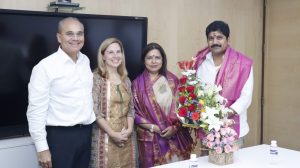 “Empowerment cannot be viewed from the narrow angle of haves and have nots. Women in power can also suffer from patriarchy. Empowerment means not having to depend on others, it is not linked to how one dresses or what one does for a living. It is about mental equality, knowing where you belong, how you express yourself, being self-assured, not letting external factors impede one’s growth and freedom.”
“Empowerment cannot be viewed from the narrow angle of haves and have nots. Women in power can also suffer from patriarchy. Empowerment means not having to depend on others, it is not linked to how one dresses or what one does for a living. It is about mental equality, knowing where you belong, how you express yourself, being self-assured, not letting external factors impede one’s growth and freedom.”On the subject of government programs that empower women directly (as individuals and responsible for their families), Ms. Lekhi drew the distinction between programs like ICDS (Integrated Child Development Services) and current programs like Ujjwala Yojana, Jan Dhan Yojna, Mudra Ayojana, and Awas Yojana where subsidies and financial assistance goes directly in the hands of women. “These programs demonstrate our trust in the capabilities of women to take care of themselves and their families. It is about helping the most vulnerable, providing help where it has not reached before.”
Continue reading →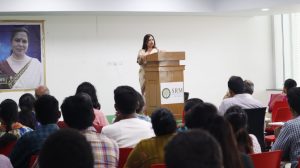 Ms. Lekhi is a Supreme Court of India lawyer. In July 2016, she was appointed as chairperson of the Committee on Privileges of the Lok Sabha in Parliament. She was awarded the “Best Debut Women Parliamentarian” award by Lokmat in 2017. She has led the debate on a wide variety of matters such as bails, trials, appeals, criminal writs, the Prevention of Corruption Act/Customs Act/FERA prosecutions, domestic violence and Family Law dispute. Lekhi has been a part of the Drafting Committees for Bills like “Women’s Reservation Bill” and “Sexual Harassment of Women at Workplace (Prevention, Prohibition and Redressal) Bill”. She also played an active role in the drafting of the Criminal Law (Amendment) Bill, 2013 which provided for amending the existing laws related to sexual violence. She has been in the National Commission for Women’s (NCW) special Committee, and Chairperson of Special Task Force on Women Empowerment Association.
Ms. Lekhi is a Supreme Court of India lawyer. In July 2016, she was appointed as chairperson of the Committee on Privileges of the Lok Sabha in Parliament. She was awarded the “Best Debut Women Parliamentarian” award by Lokmat in 2017. She has led the debate on a wide variety of matters such as bails, trials, appeals, criminal writs, the Prevention of Corruption Act/Customs Act/FERA prosecutions, domestic violence and Family Law dispute. Lekhi has been a part of the Drafting Committees for Bills like “Women’s Reservation Bill” and “Sexual Harassment of Women at Workplace (Prevention, Prohibition and Redressal) Bill”. She also played an active role in the drafting of the Criminal Law (Amendment) Bill, 2013 which provided for amending the existing laws related to sexual violence. She has been in the National Commission for Women’s (NCW) special Committee, and Chairperson of Special Task Force on Women Empowerment Association. - “Cost is the factor that connects all the dots.” Dr.Rajendran on the future of bioenergy September 7, 2019
“The Intergovernmental Panel on Climate Change (IPCC) suggests the temperature rise should be limited to 1.5°C by the end of this century for the world to survive, “says Dr. Karthik Rajendran, Assistant Professor, Department of Environmental Science. “For this, we need to reduce the emission by almost 50% of 2010 levels.” He further points out that while we may produce electric cars instead of petrol cars, electricity from solar and wind instead of coal, natural gas biologically as biogas instead of shale gas one question is at the center of these technologies – cost.
Dr. Rajendran’s quest to understand the factors influencing commercial viability of bioenergy systems began in Chennai during his bachelors’ thesis on hydrogen production leading subsequently to numerous lab simulations to understand the bottlenecks of commercialization.
On techno-economic analysis as an early indicator of commercial viability
Techno-economic analysis is an examination of various specifications of the technology at its inception stage when it is merely an experiment in a conical flask. “We analyze components on basis of all aspects of technology, economic feasibility, environmental sustainability, market realization and social integration. We can identify bottlenecks early on that hasten the technology out of the laboratory towards commercialization. This enables us to more accurately predict the fate of bioenergy/bio-based product developed out of laboratory.”
The role of institutional and government support
“In my Masters studies at UB Sweden I realized not all technologies being developed in labs are successful and that economics is not the only component that hinders commercialization. We need good institutional and governmental policy, including technical support, to advance such clean energy systems. This is when I started working on integrating technology, economics, and government policy. I compared different European technologies including biogas, electric cars, solar, and wind to understand the role of state/government subsidies towards green technology development. What I found was that electric car technologies for example do little to prevent C02 emissions, yet they receive more incentives from the government compared with other renewable energy systems. It’s about the source of electricity. Be it coal or wind plant if it’s not a green electricity source it is not a green vehicle.”
The science of energy waste conversion
Dr. Karthik Rajendran’s initial research on bioenergy production from waste looked specifically at hydrogen from algae. He currently focuses on bioenergy with carbon capture and utilization with the cost factor being the main parameter. Dr. Rajendran explains how this works. “For example, due to long term storage issues excess solar or wind energy spills over and is wasted. This excess electricity is converted to hydrogen through electrolysis. Then the hydrogen can be combined with CO2 from a bioenergy system to produce methane. This is known as Sabatier reaction. In Europe this research is happening with an aim to convert existing gas grids to a green gas grid by 2050.”
Several of Dr. Rajendran’s published papers examine electro fuels, circular bio economy and techno-economic analysis.
Continue reading → - SRM University, AP – Amaravati celebrates Founder’s Day September 4, 2019
Organises a Blood donation camp to honour Founder’s vision to serve the community
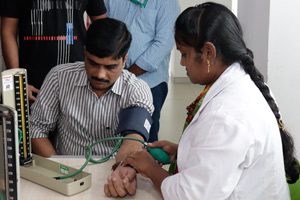
Amaravati, August 24th 2019: SRM University, AP – Amaravati celebrated Founder’s Day by organizing a blood donation camp. More than 120 college students and faculty have donated blood in the camp of which several were first time donors.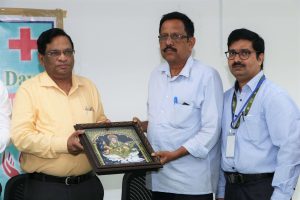 On this occasion, Prof. D. Narayana Rao, Pro Vice Chancellor, SRM University, AP-Amaravati presided over the program and shared the Founder and Chancellor, Hon’ble Member of Parliament, Dr. T.R. Paarivendhar’s vision and generous contributions to the society through various social services activities. “21 educational institutions have been established by SRM management under the leadership of Dr. Paarivendhar and till date around 1.10 lakhs students have passed out from different educational streams. Our Founder’s vision is to provide education to all and has therefore provided scholarships to the tune of Rs. 35 crore till date to the underprivileged sections of the society. The SRM institutions have more than 7,000 employees and 70,000 students currently.” shared Prof. Rao.
On this occasion, Prof. D. Narayana Rao, Pro Vice Chancellor, SRM University, AP-Amaravati presided over the program and shared the Founder and Chancellor, Hon’ble Member of Parliament, Dr. T.R. Paarivendhar’s vision and generous contributions to the society through various social services activities. “21 educational institutions have been established by SRM management under the leadership of Dr. Paarivendhar and till date around 1.10 lakhs students have passed out from different educational streams. Our Founder’s vision is to provide education to all and has therefore provided scholarships to the tune of Rs. 35 crore till date to the underprivileged sections of the society. The SRM institutions have more than 7,000 employees and 70,000 students currently.” shared Prof. Rao.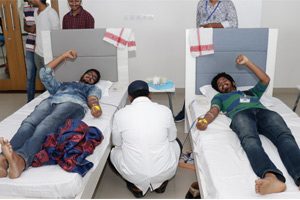 The University’s NSS division organised a blood donation camp together with the international Red Cross society. This was in line with the Founder’s vision to serve the community.
The University’s NSS division organised a blood donation camp together with the international Red Cross society. This was in line with the Founder’s vision to serve the community.“SRM Management is spending generously for the welfare of the underprivileged people.”, commented, D. Gunasekaran, Registrar, SRM University, AP – Amaravati. The Registrar also motivated and thanked the students by emphasising that blood donation is a big contribution towards the welfare of the society.
Dr. Lakshmi Rajyam, University Medical Officer, SRM University AP-Amaravati encouraged the students and staff to donate blood and explained, “A healthy body is capable of regenerating the blood donated in a few weeks’ time. India needs about 5 crore units of blood annually but has only 2.5 crore units available. This deficit can only be bridged if everyone comes forward to donate.”
Present for this celebration were – ProVC, Registrar, Deputy Registrar, University Medical Officer – Dr. Lakshmi Rajyam and Red Cross Guntur District incharge, Mr. Narasimha Rao along with faculty and students.
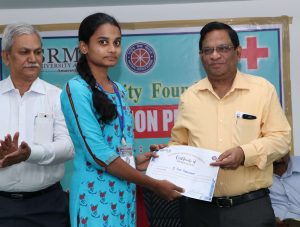 At this occasion, 20 NSS students were awarded certificates for their remarkable contributions to the community. The University got together and cut a cake to mark Founder’s Day.
At this occasion, 20 NSS students were awarded certificates for their remarkable contributions to the community. The University got together and cut a cake to mark Founder’s Day.Video Link: https://www.youtube.com/embed/ZHih6PGfI-0
Continue reading → - C Durga Rao September 3, 2019
- URC backs computational & experimental research. New R&D collaborations proposed August 27, 2019
Amaravati, 7th August 2019: At the University Research Council meeting held on campus, and presided by Dr. P. Sathyanarayanan, Founder and President of the board, a renewed commitment was made to research of national significance such as energy conservation and sustainability.
An illustrious, distinguished and accomplished group of academicians and scientists provided direction and mentorship to the faculty members and research scholars. The council comprises Prof K. Satyanarayana – Director, IIT Tirupati, Prof. U.B. Desai – Director, IIT Hyderabad, Prof. P. Appa Rao – Vice Chancellor, University of Hyderabad, Prof. Gautam R. Desiraju – IISc, Bangalore, Dr. S.R. Rao – former Senior Adviser, Department of Biotechnology, Government of India, Prof. B.S. Murthy – IIT Madras, Chennai, Dr. Padmanabham – Director, ARCI, Hyderabad, Prof. B.V.R. Chowdari – Senior Executive Director, Nanyang Technological University, Singapore and Prof. D. Narayana Rao – Pro-Vice Chancellor, SRM University – AP, Amaravati.
The meeting commenced with an opening presentation by Prof. D. Narayana Rao, Pro-Vice Chancellor, SRM AP, Amaravati highlighting the areas of research currently undertaken and proposed to carry out by the University’s 107-member faculty. The Chairman of the Research Council, Dr. V. K. Saraswat – Member of NITI Aayog, addressed all the members through a video call and advised them on the need and development of research activities. Dr. Saraswat also highlighted the importance of aligning research programs with the national agenda.
Vice Chancellor, Dr. Jamshed Bharucha emphasised SRM AP Amaravati’s focus on societal impact through original research in an interdisciplinary environment. The new research lab building and the X-Labs will facilitate these initiatives. Faculty Members made presentations on the current as well as proposed research activities
The council commended the quantum and quality of work already done by SRM AP Amaravati in just two years of inception. Members pointed out that the kind of MOUs and collaborations effected with different organisations are crucial for the faculty to be able to sustain research. Specific appreciation was about Hydrogen Powered Train (Jal-Janak Rail) being developed in collaboration with Integral Coach Factory (ICF) of the Ministry of Railways, SRM-Amara Raja Center for Energy Storage Devices. Special mention was made to the sports science centre as it is often an overlooked area.
Prof. P. Appa Rao offered that the experimental facilities of University of Hyderabad can be accessed by the faculty members of SRM University-AP, Amaravati. Dr. Padmanabham invited the faculty members of SRM University-AP, Amaravati to establish collaborations with ARCI, Hyderabad and make use of the state-of-the art experimental facilities available at ARCI.
Commenting on the occasion, Dr. Kasthurirangan Gopalakrishnan, Associate Dean – Research said, “The inputs provided by the council have not only been encouraging but have also been extremely insightful. They have provided diligent inputs and guidance. Our faculty found this experience extremely motivating.”
Continue reading →

